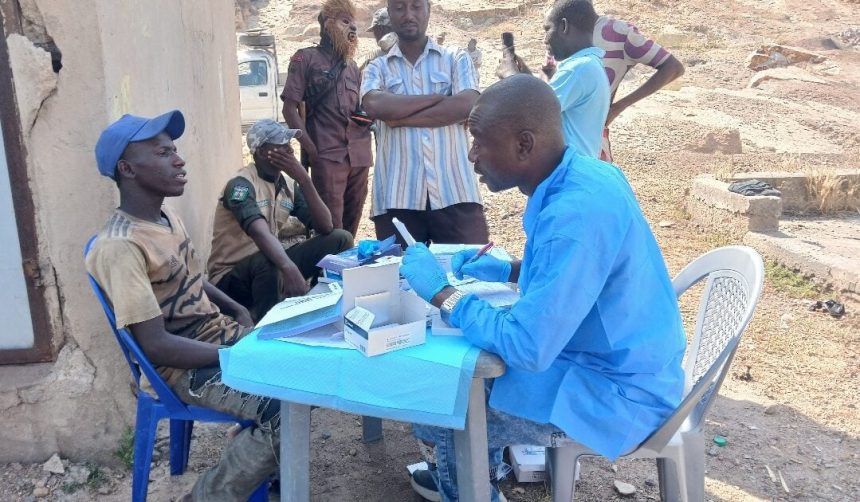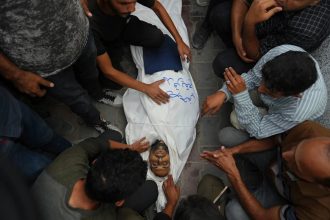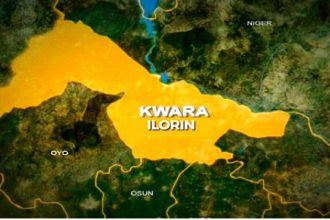The Gombe State Youth Parliament on Saturday launched the Campaign Against Drugs and Other Social Atrocities (CADOSA) to curb the rising cases of drug abuse, cultism, cybercrime, gender-based violence, and other social vices among young people in the state.
The launch, held at BCG Hill in Gombe, drew representatives of the National Drug Law Enforcement Agency, officials of the Ministry of Youth and Sports Development, leaders of youth organisations, and members of the media.
Speaking at the event, Speaker of the Gombe State Youth Parliament, Aliyu Danladi, described the campaign as “a movement of hope, awareness, and responsibility,” adding that the Parliament is determined to safeguard the future of young people from the dangers of substance abuse and other destructive habits.
Danladi said, “Today’s gathering at BCJ Hill is not just a hike. It is a movement of hope, awareness, and responsibility.. We are here to declare, with one voice, that the future of Gombe State will not be surrendered to the dangers of drug abuse, cultism, cybercrime, gender-based violence, and other vices that destroy the dreams of our young people.”
Citing the 2018 National Drug Use Survey conducted by the NDLEA and the United Nations Office on Drugs and Crime, Danladi expressed concern that nearly 15 million Nigerians—mostly youths—have used drugs, with the North-East region among those with the highest prevalence rates.
“This reality demands not just enforcement, but also education, prevention, and community engagement,” he said.
He explained that the CADOSA campaign would run for one year, featuring social media sensitisation, radio programmes, school outreaches, and community engagements across all constituencies in Gombe State.
“Our goal is simple: to inspire young people to say no to drugs, to choose health over harm, and to build a generation that leads with discipline, creativity, and purpose,” the Speaker added.
Danladi commended the NDLEA Gombe Command, partners, sponsors, and volunteers for their collaboration and support, stressing that the fight against drug abuse requires collective effort.
“The fight against drugs is not the duty of NDLEA alone, but a collective responsibility of all citizens. Together, we can make our communities safer, our youths stronger, and our future brighter,”
he said.
Programme Officer, Drug-Free and Preventive Healthcare Organisation, Fauziyya Abubakar, said, “We work with people using drugs. We help them access healthcare services, support them with human rights services, and provide other harm reduction services, including HIV testing, drug-related prevention, and management.”
Explaining the collaboration, Abubakar added, “Today, we joined the Gombe State Youth Parliament to create awareness on prevention. If you haven’t started drugs, please don’t start. We want the community to understand that drug use is not a choice but a health issue.”
Founder and Executive Director of the LEO Foundation, Abba Mukhtar, said the initiative would impact communities positively.
“You know we have more youths in our various communities, and drug addiction is gradually becoming a scourge,” Mukhtar said.
Founder, Drug-Free and Health Awareness Initiative, Mohammed Haruna, added, “We want to create awareness on drugs and substance abuse. This is threatening every aspect of our lives and reducing the productivity of our youth. We focus on campaign awareness, rehabilitation support, school engagement, and advocacy policy.”
Coordinator of Youth O’clock, Sani Labaran, said, “Youths prioritise sleep; we need to awaken them. The future of any community lies in the hands of the young people. If we fail to unite, nobody will do it for us.”
Youth advocate, Sale Katam, lauded the organisers for the initiative.
“Those who use drugs are our brothers and sisters. By discriminating against them, we are only pushing them further into substance abuse. Let’s show them compassionate care; let’s see the human in them before anything else,” Katam said.
He also urged policymakers to focus on laws that prioritise rehabilitation services. “Harm reduction is an evidence-based strategy to stop substance abuse. Discrimination is doing more harm than good,” he added.
Permanent Commissioner for Electoral Matters, Gombe State Independent Electoral Commission, Mohammed Hussaini, commended the Parliament for organising the hike.
“It’s not about hiking but about creating awareness about drug abuse and substance use. As a Commission that advocates youth participation, we want youths to be responsible, and drugs won’t make you useful,” he said.
Focal Person for Investment, Digital and Creative Enterprise, Gombe State, Saifullahi Waziri, said, “This hike is more than that; it’s our collective effort and energy to tackle the menace threatening the future of our state and, most importantly, our youths.”
He noted that drug abuse has a link to economic stagnation. “It thrives in the vacuum created by unemployment, poverty, and lack of viable economic opportunities. When young people feel hopeless, lack purpose, or see no path to a dignified life, they become vulnerable to the false promises of drugs. Individuals struggling with drugs can’t contribute to the economy, leading to loss of opportunities and becoming a drain on families and the state,” Waziri added.









